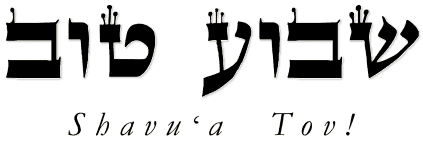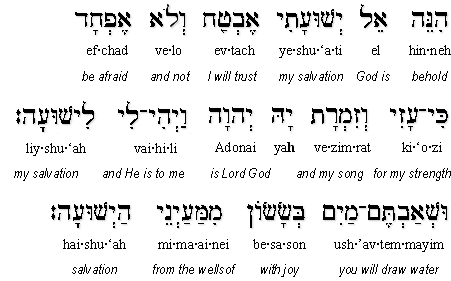|
|
 |
 |
|
Distinguishing the Sacred from the Profane
|
|
|
 |
 |
|
You are to distinguish between the holy and the common,
and between the unclean and the clean.
- Leviticus 10:10
|
 |
 |
|
THE HAVDALAH (literally, "separation") ceremony is observed at the end of Shabbat (on Saturday night, when three stars are visible in the sky), in order to mark the distinction between the departing sacred day and the coming ordinary weekday. One way to begin your Havdalah ceremony is to go outside and look at the stars to behold the wonder of God's creation.
|
|
|
 |
 |
|
The ceremony is usually celebrated at home with family or friends and includes three blessings -- over wine, spices, and light -- as well as the hamavdil, a blessing thanking God for separating the days and making the Shabbat sacred. Three components are required for the home ceremony:
|
|
|
 |
 |
|
- A tall, braided candle with several wicks
- A Kiddush cup of wine
- A box filled with fragrant spices (besamim)
|
|
 |
 |
|
Opening Scriptures
|
 |
 |
|
Blessing over the wine
|
 |
 |
 |
 |
 |
 |
 |
 |
 |
 |
 |
 |
 |
 |
 |
|
 |
 |
 |
 |
|
 |
 |
 |
 |
 |
 |
 |
 |
 |
 |
 |
 |
 |
 |
 |
 |
 |
 |
|
Just as Sabbath is welcomed with wine, so it is concluded with wine as well. We lift the Kiddush cup of wine and say the blessing, but do not drink from the cup at this time:
|
|
|
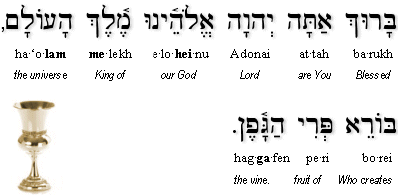 |
|
|
|
 |
|
|
|
|
|
Blessed are You, Lord our God, King of the universe,
Who creates the fruit of the vine.
|
|
|
|
Barukh attah Adonai eloheinu melekh ha-olam,
borei peri hagafen.
|
|
|
|
Blessing over the spices
|
|
|
|
A special spice box filled with fragrant herbs (besamim) is used to represent the redolence of Shabbat (the spices commonly used are cloves, cinnamon, or bay leaves). Since smelling spices helps distinguish special fragrance from the more ordinary, part of the reason for the besamim box is to illustrate another separation of the sacred from the profane. The following blessing is said upon smelling the spice box:
|
|
|
|
 |
|
|
|
 |
|
|
|
|
 |
|
|
|
|
|
|
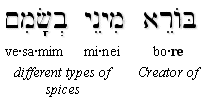 |
|
|
|
|
|
Blessed are You, Lord our God, King of the universe, Creator of
different types of spices.
|
|
|
|
Barukh attah Adonai eloheinu melekh ha-olam,
borei minei ve-samim.
|
|
|
|
Blessing over the fire
|
|
|
|
The Havdalah candle represents light, the first element created by God at the beginning of the first week. Lighting this candle is the first act of work permitted on the yom khol. After lighting, hold your hands close to the flame in order to see the reflection of the flame on our fingernails or the shadow on your palm. This light represents the light by which we can now work with our hands in the world around us. The following blessing is said upon considering the light:
|
|
|
|
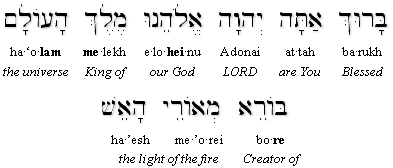 |
|
|
|
 |
|
|
 |
|
|
|
|
|
|
|
|
|
|
Blessed are You, Lord our God, King of the universe,
Creator of the light of fire.
|
|
|
|
Barukh attah Adonai eloheinu melekh ha-olam,
borei me-orei ha-esh.
|
|
|
|
The braided candle represents light, the first element referred to in Genesis at the beginning of the first week of creation. It also represents the creation of fire. A midrash teaches that, at the end of the first Shabbat, Adam was struck by fear with the coming of darkness. To abate this fear, God gave him knowledge and the tools to create fire, thus his fear was abated.
|
|
|
|
Hamavdil - the Havdalah Blessing Proper
|
|
|
|
The last blessing of the ceremony is the hamavdil, the blessing over the separation of different things. This blessing is recited over the Kiddush cup of wine using only the light of the Havdalah Candle:
|
|
|
|
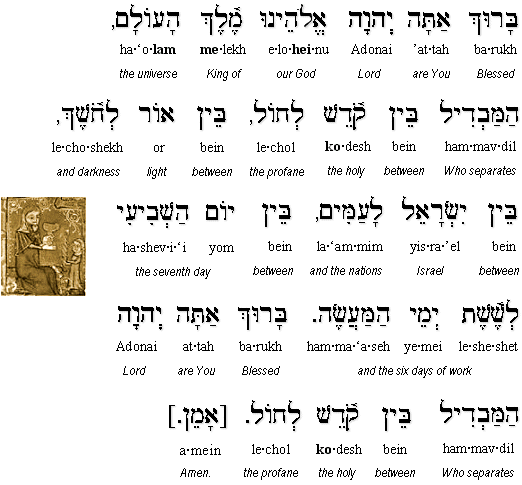 |
|
|
|
 |
|
|
|
|
|
Blessed are You LORD our God, King of the universe, who distinguishes between the holy and the profane, between light and darkness, between Israel and the nations, between the seventh day and the six days of work. Blessed are You, LORD, who distinguishes between the holy and the profane. Amen.
|
|
|
|
Barukh attah Adonai elhoheinu melekh ha-olam,
hamavdil bein kodesh le-chol, bein 'or le-choshekh,
bein yisrael la'amim, bein yom hashevi'i le-sheshet ye-mei hama'asheh.
Barukh attah Adonai, hamavdil bein kodesh le-chol. Amen.
|
|
 |
 |
|
AFTER THE BLESSING is completed, we spill a small amount of the wine from the Kiddush cup onto a plate ( to symbolize the loss of Shabbat) and then drink from our cups. Finally, we extinguish the flame from the Havdallah candle by dipping it into the wine cup and listening to it sizzle. The room is now entirely dark. We turn on the lights and the sing the song Eliyahu Hanavi ("The Prophet Elijah") and wish everyone present "Shavu'a Tov" – a good week ahead!
|
|


